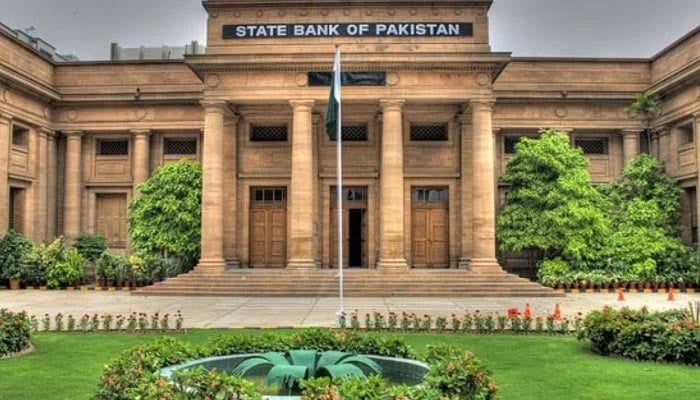SBP massively hikes interest rate by 300bps to 20% — highest since Oct 1996
Monetary Policy Committee will now meet on April 4 to revise record high interest rate
KARACHI: In accordance with the several conditions set by the International Monetary Fund (IMF), the State Bank of Pakistan on Thursday jacked up the key interest rate — in an off-cycle review — by a massive 300 basis points (bps) taking it to a record high level of 20%.
The Monetary Policy Committee (MPC) — which was constituted as a statutory committee under the State Bank of Pakistan Act — decided to increase the policy rate to its highest level since October 1996 in an attempt to "anchor inflation expectations as it is critical and warrants a strong policy response".
The central bank raised the benchmark interest rate by 300 bps today taking the total increase to 1,050bps since January 2022 to counter rising inflation.
It should be noted that the MPC meeting was originally scheduled for March 16, 2023, but the SBP decided to "prepone" it to deal with emerging risks to the economy including a record inflation number, which clocked in at a nearly 50-year high of 31.5% in February.
“During the last meeting in January, the committee had highlighted near-term risks to the inflation outlook from external and fiscal adjustments,” the Monetary Policy Statement (MPS) read. It further mentioned that most of these risks have materialised and are partially reflected in the inflation outturns for February.
The national inflation calculated on the basis of the consumer price index (CPI) has surged to 31.5% on an annual basis, while core inflation rose to 17.1% in urban and 21.5% in a rural basket in February 2023.
In today’s meeting, the MPC noted that the recent fiscal adjustments and exchange rate depreciation have led to a significant deterioration in the near-term inflation outlook and a further upward drift in inflation expectations, as reflected in the latest wave of surveys.
Therefore, the committee expects inflation to rise further in the next few months as the impact of these adjustments unfolds before it begins to fall, albeit at a gradual pace. It also changed its forecast for the average inflation this year which is now expected in the range of 27-29% against the November 2022 projection of 21-23%.
‘Vulnerabilities continue to persist’
On the external side, the committee observed that despite a substantial reduction in the current account deficit, the “vulnerabilities continue to persist”.
In January 2023, the deficit fell to $242 million, the lowest level since March 2021. Cumulatively, the current account deficit — at $3.8 billion in the July-January fiscal year 2022-23 — is down 67% compared to the same period last year.
“Notwithstanding this improvement, scheduled debt repayments and a decline in financial inflows amid rising global interest rates and domestic uncertainties, continue to exert pressure on the foreign exchange reserves and the exchange rate,” the statement read.
The central bank’s statutory committee acknowledged that the forex reserves remain low and “concerted efforts are needed to improve the external position”.
It should be noted that foreign exchange reserves held by the central bank stand at $3,258.5 million as of the week ended February 17, which will provide an import cover of around three weeks.
“In this regard, the conclusion of the ongoing ninth review under the IMF’s External Fund Facility (EFF) will help address near-term external sector challenges,” it mentioned.
Furthermore, it stressed on the urgent need for energy conservation measures to alleviate pressure on the external account and meet the import requirements of other sectors.
Fiscal consolidation to complement monetary tightening
Highlighting some of the recent fiscal measures taken by Ishaq Dar-led Ministry of Finance, the MOC said that these — including an increase in general sales tax and excise duties, reduction in subsidies, adjustments in energy prices, and the austerity drive — are expected to help contain the otherwise widening fiscal and primary deficits.
“The envisaged fiscal consolidation is critical for economic stability and will complement the ongoing monetary tightening in bringing down inflation over the medium-term,” the statement read, adding that the committee emphasised that any significant fiscal slippages will undermine monetary policy effectiveness in the context of achieving the price stability objective.
New rate to 'anchor inflation'
In its forward guidance, the MPC — which will now meet on April 4, 2023 to review the key interest rate — mentioned that on growth there exists a trade-off.
The committee, nonetheless, reiterated its earlier view that the short-term costs of bringing down inflation are lower than the long-term costs of allowing it to become entrenched.
“Barring unexpected future shocks, the MPC noted that today’s decision has pushed the real interest rate in positive territory on a forward-looking basis,” the statement read.
The central bank’s officials believe that this current rate will help anchor inflation expectations and steer inflation to the medium-term target of 5-7% by the end-fiscal year 2024-25.
-
Bitcoin plummets toward $60,000 as investors dump risky bets
-
Bitcoin crashes below $63K as regulatory pressure and market fears grow
-
Bitwise Crypto Industry innovators ETF: What investors should do in 2026?
-
Nintendo shares slide again as momentum fears grow
-
Gold, silver prices fallen sharply; What’s driving the drop?
-
Gold’s record climb: Experts question if its safety is ‘overstated’
-
Dubai unveils plans to construct street built with real gold
-
Netflix slams Paramount’s bid: 'Doesn't pass sniff test’ as Warner battle escalates












